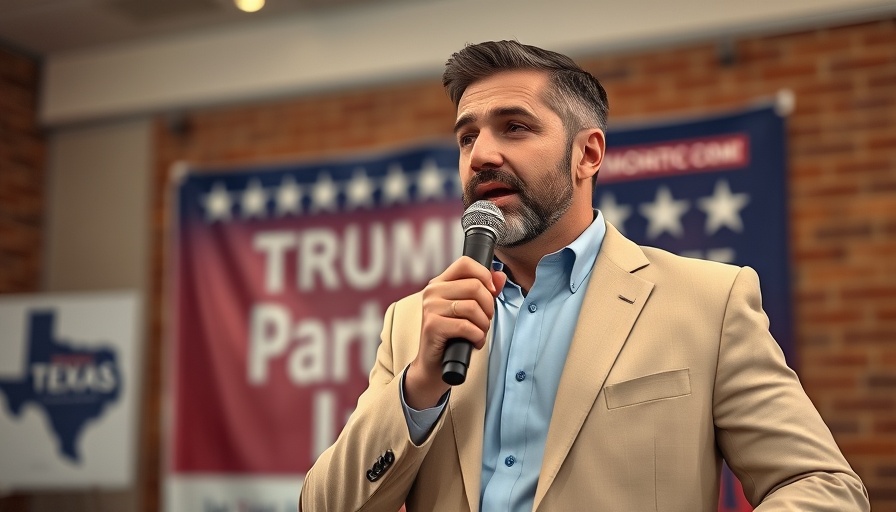
Rebuilding the Texas Democratic Party: A Grassroots Approach
In the wake of recent electoral disappointments, Texas Democrats find themselves at a crossroads. The new chair, Kendall Scudder, a self-identified progressive with a decade of political experience, is determined to pivot the party’s strategy to focus on grassroots engagement. Scudder's win comes after a tumultuous era under former chair Gilberto Hinojosa, whose leadership saw fleeting hope overshadowed by disappointment as the demographics of Texas shifted towards a more conservative ideology.
Understanding Scudder’s Vision
Scudder’s election is not merely a change in leadership but a potential harbinger of a new political era for Texas. With half of Texas’ precinct chair positions vacant, he emphasizes a need for robust local engagement, stating, "If we’re not even walking in the door in these communities, then don’t put your jaw on the floor and be shocked when you start losing there." This statement reflects a grounding realization: community must be at the heart of political strategy.
A targeted approach to fill these vacant positions could redefine the party's outreach efforts, resulting in a renewed connection with local voters. Scudder aims to recruit individuals who resonate with diverse communities across Texas.
Counterarguments to the Establishment
While Scudder's ambitious approach seeks to reinforce grassroots organizing, some experts argue that without an overarching narrative or a clear policy direction, these efforts could flounder. Critics point out that a fragmented approach may dilute the party's message and lead to a lack of cohesion among candidates, echoing sentiments that have hindered Democratic candidates in past elections. However, proponents of Scudder’s vision contend that such grassroots mobilization can lead to a more authentic representation of community needs, thereby re-establishing trust in local leadership.
Texas Politics Shifting: Patterns and Predictions
Historically, Texas has been a battleground for political ideologies. The shift towards conservatism, especially in regions like South Texas, complicates the landscape for the Democratic Party. Scudder's commitment to grassroots efforts could serve as a crucial counterbalance to these trends. If successful, this could not only aid in winning back Republican-leaning areas but also invigorate young voters disenchanted with traditional politics. The future may see a reinvigorated Democratic Party that captures the diverse voices across Texas, provided Scudder can successfully navigate the challenges of the state’s mid-sized cities.
Unique Challenges of Grassroots Mobilization
In tackling these challenges, particularly in a sprawling state like Texas, it’s essential to adapt strategic operations to suit local contexts. Some challenges include addressing socio-economic discrepancies and facilitating outreach in less populated regions. For instance, Scudder’s analysis of demographic data from affordable housing and real estate could provide insights into underserved communities, enhancing targeted outreach.
The Importance of Messaging
Beyond efforts to fill chairs and mobilize voters, the clarity of the Democratic message remains crucial. Scudder advocates for unity through a collective message that resonates with every member of the party. This approach could involve synthesizing varied interests from urban centers to rural communities, ensuring that local concerns are not overshadowed by national narratives. Engaging in conversations with constituents, understanding their pain points, and advocating for policies that address these issues are pivotal steps in Scudder’s grassroots strategy.
Engagement: The New Frontier in Politics
With Kendall Scudder at the helm, the Texas Democratic Party might finally chart a course that focuses on engagement over disillusionment. His proactive spirit reflects a broader shift within the party—a rejection of complacency and an embrace of grassroots advocacy. Scudder’s journey exemplifies how revitalizing local political structures can lead to increased representation and engagement across Texas. The question remains, will Scudder’s vision of a reinvigorated, grassroots-driven party succeed in fostering meaningful change?
The call to action for Democrats is clear: engagement starts at home. Those interested in fostering change within their communities should consider running for local party positions or volunteering to bolster the outreach efforts. A stronger grassroots foundation can only benefit the representation of voices across Texas—making every vote count towards a brighter future.
 Add Row
Add Row  Add
Add 




Write A Comment